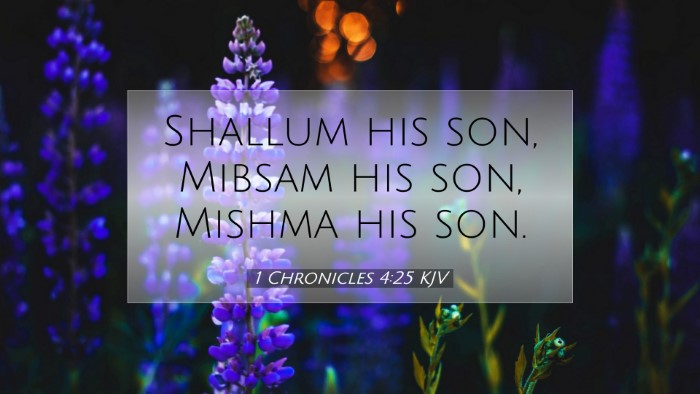Bible Commentary on 1 Chronicles 4:25
Verse Text: "And Shelah, the son of Judah, had a son, Er; and Er was the father of Lecah."
Introduction
This verse is one of the genealogical entries in 1 Chronicles, which is significant for tracing the lineage of the tribes of Israel. Genealogies serve an important purpose in Scripture, highlighting God's covenant faithfulness and His sovereignty in the unfolding of redemptive history.
Contextual Background
The book of 1 Chronicles aims to provide a detailed account of Israel's history, especially focusing on the faithfulness of God to His people through their genealogies. These records affirm the legitimacy of the tribes and their inheritance.
Genealogical Significance
The mention of Shelah as the son of Judah establishes a vital link in the lineage of the tribes, emphasizing the importance of heritage. Judah, being one of the twelve tribes, plays a crucial role in biblical history, being the tribe from which King David and ultimately Jesus Christ come.
-
Matthew Henry:
In his remarks, Henry discusses how genealogies are important for understanding the fulfillment of God's promises, tracing back through the lineage to show His providential care.
-
Albert Barnes:
Barnes points out that Shelah’s lineage connects to larger theological themes, including the promise made to Judah that he would have a preeminent progeny.
-
Adam Clarke:
Clarke elaborates on the historical context, noting that genealogical records were essential for tribal identity and inheritance rights in ancient Israel.
The Character of Er
Er, the son of Shelah, holds significance in this verse. He is referenced for his role in ancestry, although little is said about him directly in this passage. The mention of individuals in genealogies, even without significant narratives, shows that each person plays a part in God’s overarching plan.
-
Matthew Henry:
Henry emphasizes the importance of every individual in God’s plan, even those who seem to have fewer notable actions recorded in Scripture.
-
Albert Barnes:
Barnes interprets Er’s lineage as pointing to instances of faithful obedience to God’s covenant, illustrating how subsequent generations play vital roles even if not all are detailed.
-
Adam Clarke:
Clarke provides insight into the implications of Er’s life and legacy in terms of covenant fidelity and the importance of familial connections in the context of worship and community.
Theological Reflections
This verse, while brief, invites deeper theological reflection. Genealogies remind us that God works through families and nations to accomplish His purposes.
-
Covenantal Promises:
These genealogical listings reaffirm God’s covenants with His people, assuring believers that His plans unfold through generations. The lineage of Judah assures the faithfulness of God to His promises.
-
Divine Sovereignty:
The lineage illustrates God's sovereignty over history. Each name carries weight in the narrative of redemption, demonstrating that even seemingly obscure individuals matter in God's grand design.
-
Community Identity:
Understanding one’s heritage and involvement in a broader community can motivate contemporary believers to engage faithfully in God’s mission.
Practical Applications
While a seemingly simple verse, it denotes the importance of legacy and commitment to God’s mission through family and community. Pastors, theologians, and students can draw from this verse in several ways:
-
Encouraging Family Worship:
Church leaders can use this text to emphasize the significance of family commitments to God. Encouraging shared worship and obedience is an essential step in faithful generational transmission of faith.
-
Appreciating Heritage:
Understanding one's spiritual lineage can provide believers with a sense of identity and belonging within the church and history of faith.
-
Commitment to Memory:
Encouraging congregants to commemorate their ancestors' faithfulness can inspire healthier community dynamics and faithfulness in the present.
Conclusion
1 Chronicles 4:25, though concise and genealogical, presents meaningful insights into divine faithfulness, covenant continuity, and the significance of each individual within God's sovereign plan. The legacy of faith that connects generations is essential for understanding the broader narrative of Scripture and God's relationship with His chosen people.


